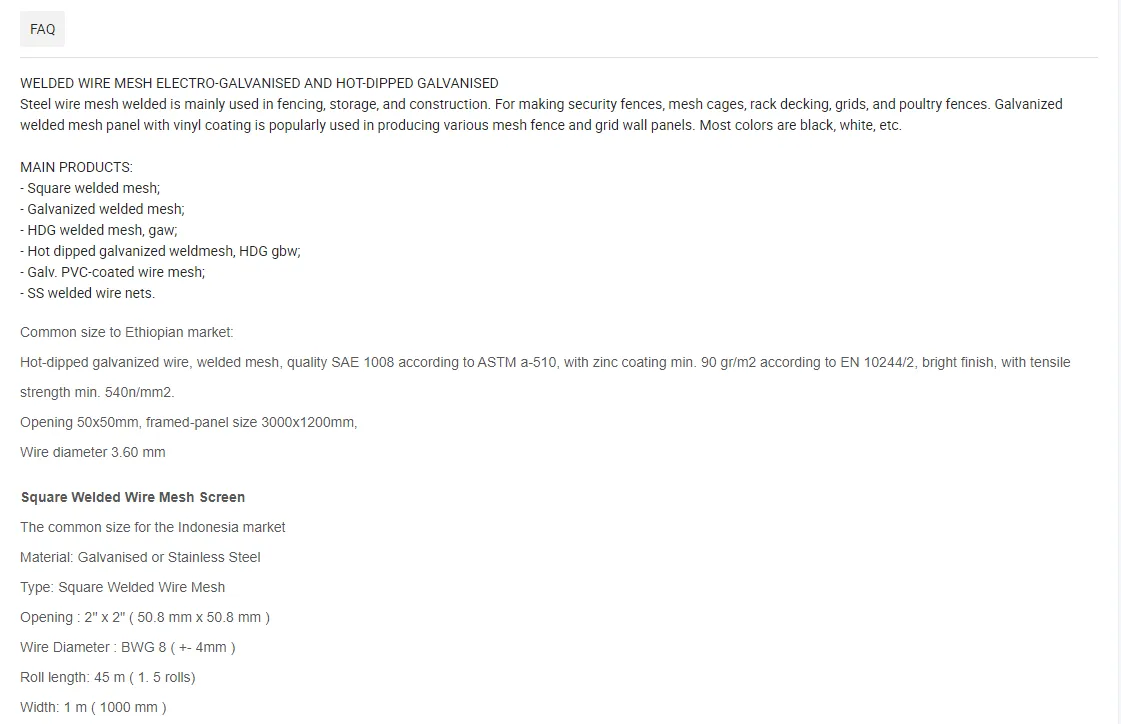Understanding Expanded Metal Mesh Thickness A Comprehensive Guide
Expanded metal mesh is a versatile material widely employed in various industries, including construction, architecture, automotive, and security. This mesh is created from a single sheet of metal that is slit and stretched to form a lattice-like pattern, providing strength and flexibility. One of the key factors to consider when selecting expanded metal mesh is its thickness, which can significantly impact its performance and suitability for different applications. In this article, we will explore the importance of expanded metal mesh thickness, the factors that influence its selection, and how it affects the overall functionality of the mesh.
What is Expanded Metal Mesh?
Expanded metal mesh is engineered from a flat sheet of metal, which is typically made from materials such as aluminum, stainless steel, mild steel, or other alloys. The manufacturing process involves cutting slits into the sheet and then stretching it, creating a series of openings that maintain the sheet's integrity while reducing weight. The resulting mesh offers various benefits, including improved airflow, visibility, and accessibility while providing necessary structural support.
The Importance of Mesh Thickness
The thickness of expanded metal mesh is a crucial parameter that can dictate its strength, durability, and application suitability. Generally measured in gauge or millimeters, the thickness can range widely depending on the material used and the intended use of the mesh.
1. Strength and Durability Thicker expanded metal mesh is usually stronger and more durable than its thinner counterparts. It can withstand greater loads, making it suitable for heavy-duty applications such as safety barriers, walkways, and industrial equipment. Conversely, thinner meshes might be more suitable for lightweight applications such as decorative elements or light-duty screening.
2. Weight Considerations The thickness of the mesh will directly impact its weight. In applications where weight is a concern, such as in aerospace or automotive designs, opting for a thinner mesh may be necessary. However, it is essential to balance weight with the mesh's required strength to ensure safety and performance.
3. Corrosion Resistance When selecting expanded metal mesh for outdoor use or in environments with high humidity, the thickness can also affect corrosion resistance. Thicker materials often provide increased protection against rust and degradation. Additionally, the choice of material—whether galvanized, painted, or coated—will further influence the overall longevity of the mesh.
expanded metal mesh thickness

4. Aesthetic Appeal In architectural applications, the thickness of expanded metal mesh can also impact its aesthetic qualities. Thinner mesh can create a more delicate appearance, suitable for modern design themes, while thicker mesh may convey a more robust look, fitting for industrial or contemporary architecture.
Selecting the Right Thickness
When choosing the appropriate thickness for expanded metal mesh, several factors should be considered
- Application Requirements Understanding the specific requirements of your project is paramount. For high-load or structural applications, opt for thicker mesh. For decorative or light-duty uses, a thinner mesh may suffice.
- Material Type Different materials have varying strength-to-weight ratios. For instance, aluminum offers good strength even at a thinner gauge, while steel might require a thicker gauge for comparable strength.
- Environmental Conditions Consider where the mesh will be installed. In harsh environments, select a thicker or more corrosion-resistant material to ensure durability.
- Regulatory Standards Depending on the industry, there may be regulations or standards that dictate minimum thickness requirements for safety and performance.
Conclusion
The thickness of expanded metal mesh is a vital consideration that affects its strength, durability, weight, aesthetic appeal, and suitability for various applications. Taking the time to analyze the specific needs of your project and the environmental factors at play can lead to the optimal selection of mesh thickness. Ultimately, understanding these aspects can enhance the performance and longevity of your expanded metal mesh installations, making it an indispensable component across numerous fields. Whether you're designing a safety railing, creating decorative facades, or installing functional barriers, the right thickness will provide the balance between strength and flexibility necessary for success.
-
Turn Down the Noise: The Future of Highway Sound Barriers
NewsApr.09,2025
-
Silence the Sound: The Power of Highway Noise Barriers
NewsApr.09,2025
-
Reduce Road Noise Effectively with Highway Noise Barriers
NewsApr.09,2025
-
Noise-Free Living: How Highway Barriers Make a Difference
NewsApr.09,2025
-
Engineered for Silence: Highway Noise Barriers for Every Road
NewsApr.09,2025
-
Effective Noise Control: Highway Barriers for a Quieter Tomorrow
NewsApr.09,2025
Subscribe now!
Stay up to date with the latest on Fry Steeland industry news.

